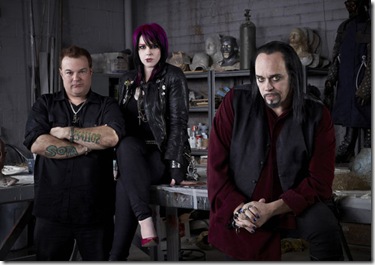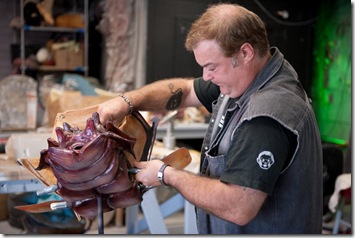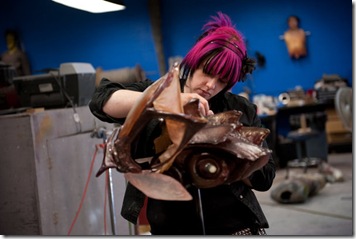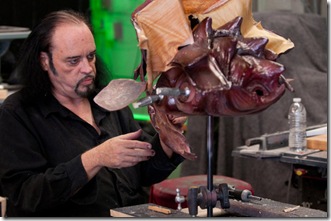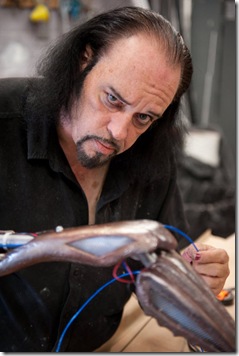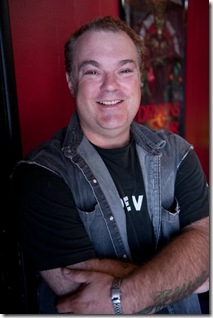Earlier this week, Cleve Hall, Constance Hall and Roy Knyrim took some time to discuss their work and their new reality series, Monster Man [Syfy, Wednesdays, 10/9C], with a host of journalists/bloggers.
Between them, the three have over seventy-five years of experience in creating make-up and practical monster effects. If that wasn’t enough to prove they love their work, then the following definitely is.
Hi everyone. Thanks for taking time to talk to us today.
So, from the show it looks like you guys have some really tight schedules. How do you balance innovation with using just what you already know in your existing methods in order to meet the deadline?
Cleve Hall: I would say — this is Cleve Hall — 35 years of experience of having horrible deadlines.
Roy Knyrim: Yes, kind of used to it. Yes, this is Roy Knyrim, so yes – Cleve and I have been used to this. I mean we’ve worked on these B kind of level budget movies for 25-30 years. It’s crazy.
Constance Hall: We wouldn’t even know what to do if we had like plenty of time for us…
((Crosstalk))
Cleve Hall: …she just read my mind.
Roy Knyrim: Yes.
Cleve Hall: We wouldn’t know what to do with ourselves if we had enough time.
Roy Knyrim: Yes.
Now, how has, like, digital CGI effects changed the business? And have you guys gotten into that at all?
Roy Knyrim: It killed it.
Constance Hall: There isn’t as much as there was back in the day.
Cleve Hall: The olden days.
Roy Knyrim: Yes what SOTA’s has to do really over the last 15-16 years is Cleve and I and Constance have done a lot of live kind of stage show stuff. We’ve done stuff for Alice Cooper, Insane Clown Posse, Devo, so we’ve done that, and then Kiss. We’ve done that to augment the movie and TV stuff too.
Cleve Hall: Honestly, I don’t – this is Cleve again. I don’t have anything against CGI when it’s used to enhance a physical effect, but then when it’s used to replace one, that hurts.
Roy Knyrim: Yes. I mean, this is Roy again. We did Starship Troopers III, and one of the cool things we did is we did a lot of stuff practical and they augmented in CGI and it came out really, really well. It was a great marriage of the two techniques.
And finally, Constance, how – can you talk about how and when you got involved in the family business?
Constance Hall: I started following my dad at work when I was like 13 years old, and so every since then. I had school and stuff like that and some odd jobs. But for the most part, I’ve been working with my dad in the shop since then. So going on 10 years now.
Cleve Hall: Don’t soft pedal it. She was teaching the other people how to do this stuff – much older people – how to do the work when she was 13.
Constance Hall: What can I say? I was a smartass.
Roy Knyrim: I thought – oh, yes. As soon as she came out of Sonia she was in the business.
So I – but anyway, so can you just kind of talk about in general what kinds of creatures and that we’re going to see throughout the season?
Roy Knyrim: You’re going to see hairy ones, slimy ones…
Constance Hall: Scaly ones.
Cleve Hall: Yes.
Roy Knyrim: Buggy ones.
Cleve Hall: Yes, lots of bugs. And giant Japanese monsters.
Roy Knyrim: And giant Japanese monsters.
Constance Hall: But they’re not really Japanese because we’re not Japanese.
Roy Knyrim: We’re not Japanese.
Cleve Hall: Giant Los Angeles monsters.
Constance Hall: Giant Japanese-style monsters.
Roy Knyrim: And ice monsters.
Cleve Hall: Yes, those are different.
All right. What’s generally the hardest part when you’re creating a creature besides the budget and time, because those are kind of obvious. What’s the hardest part besides that?
Constance Hall: Getting along working with each other sometimes can be incredibly difficult.
Roy Knyrim: Yes. This is Roy. I think personally it’s trying to have Cleve or whoever design or envision what the producers want. Because most of the times, the producers can’t tell you from their mind to paper what they want and that’s where Cleve comes in to try to do that.
That’s the other thing I was going to ask, because usually how much input do you get? I mean, do – is it usually that they hand you and they say this is exactly what they want? Or do they ever just say, design whatever you want? Is it just like kind of depends on the show.
Roy Knyrim: It’s like 50/50.
Cleve Hall: 50/50.
Constance Hall: It kind of goes that way. Sometimes the producer comes in and has a design that they want completely dead on that design, and then sometimes there’s kind of like, ‘We want something with tentacles.’ like…
Cleve Hall: And the first episode, that business when I saw that shark head and they had it designed with the two – the heads on top of each other, oh my God. I mean that literally – I mean my…
Yes, I didn’t get that.
Roy Knyrim: Yes.
Cleve Hall: Did not see that coming.
Roy Knyrim: And you have to tread a fine line because if they’re in love with something and you want to change it, they could just go somewhere else and get it made you know. So it’s difficult. You don’t want to tell them that you think their idea’s not good. You’ve got to be very political about it.
Cleve Hall: I mean if I can’t convince them to change it, then I’ll do what they want, I just won’t feel good about it.
My first question I guess is for Cleve. Reading up and talking to (Kristin) who met you last year down there in Florida, she’s – you’re really influenced by monster movies and I can see the effect it had on you as a kid. I wondered if there any like – kind of like non-monster type props that impressed you as well when you were younger? Where you made your first (scheduled testing)?
Cleve Hall: Harold and Maude. That Hearse – oh, I cried at the end of that movie. Not so much because Maude died, but because he drove that beautiful Jaguar Hearse off the cliff and I cried.
Constance Hall: And he loved Cat Stevens.
Cleve Hall: Yes. That was a big influence on me because my whole gothic kind of thing – and a lot of – yes, that’s it, Harold and Maude I would say.
Oh, yes. That’s a good one. And Constance, I have a question for you real quick. A lot of people have a problem working with dad. Can you tell me kind of – what made you as a young woman say, ‘Yes. I’m doing this with you, dad.’
Constance Hall: Well you’re right; a lot of people do have problems working with my dad.
((Crosstalk))
Constance Hall: But I don’t know. Me and my dad kind of get each other usually in a way that a lot of probably people don’t – parents and kids don’t, like click. We’ve always kind of been pretty close and kind of gotten each other for the most part. Sometimes our communication gets a little bit…
Cleve Hall: Well the only – the big problem is she’s the one…
Constance Hall: For the most part.
Cleve Hall: The big problem is she’s more mature than I am.
Constance Hall: Yes, that is a big problem.
Roy Knyrim: Well this is Roy, and looking in as an outsider, I think that they’re not only as father and daughter, but I think they’re very close friends.
Cleve Hall: Yes.
Roy Knyrim: So it’s like a different thing. Even if they weren’t father and daughter, they would be together like this.
Constance Hall: That, and I’m his babysitter, so that’s pretty much my job.
Cleve Hall: Me, not anybody else.
So, how do you decide what materials that you’re going to work with on the build?
Constance Hall: It all depends on the like – well budget definitely comes in to play, but also what does like this monster have to do? If this monster has to be in water, then that’s obviously going to be different materials than if it’s not. It all just depends on the scene and what it’ll have to do.
Cleve Hall: And there’s also a look too, like silicon versus foam latex and things like that. It depends on the look.
Roy Knyrim: Yes. It depends on what it – also if it’s on an actor it’s going to be silicon or foam latex. If it’s a giant monster, it might be foam fabricated or anything. Yes.
Cleve Hall: But there’s also a bottom-line kind of think that I kind of go with, and that’s go with what you know. Sometimes I’ll use the materials that I’m really familiar with rather than experimenting because we don’t have time for that.
Roy Knyrim: Yes. Yes, that’s true too. I think some of the materials are quicker than the other ones too.
Cleve Hall: Yes.
Is there any particular material that like you really can’t stand to work with but you have to anyway, or that you try to avoid?
Roy Knyrim: Resounding fiberglass for the three of us.
Constance Hall: It’s all icky.
Cleve Hall: Icky.
Roy Knyrim: It stinks.
So what are your favorite types of effects or genre to work on?
Cleve Hall: Giant monsters stomping on buildings and destroying tanks and fighting each other.
Roy Knyrim: That’s Cleve, this is Roy here. I love gore movies. I love spraying blood around.
Constance Hall: I like spraying blood with Roy. That’s fun. And anything with (unintelligible).
And do you have any favorite…
((Crosstalk))
Cleve Hall: Tell him when we use the glossy glitter in giant monster movies.
Do you have any favorite projects that you’ve worked on? Like what’s your absolute favorite thing that you’ve done?
Cleve Hall: You know (which) one.
Roy Knyrim: Yes. Yes.
Cleve Hall: You’ll see that later.
Roy Knyrim: Yes.
Cleve Hall: We’re not supposed to let that out yet.
Roy Knyrim: Yes. The last episode we – I get to direct. This is Roy. I get to direct a music video for Devo and we get to do all the effects. Cleve does giant monsters. It’s probably like the coolest thing we’ve done in years.
Cleve Hall: And then Pee Wee’s Big Adventure because I got to play Godzilla in that.
Roy Knyrim: In Ed Wood – we did the giant octopus for Ed Wood. That was fun.
Constance Hall: And Ursula, because that was my (unintelligible) because she was sparkly.
Cleve Hall: I mean, the Ursula for the Annie Leibovitz shoot.
Constance Hall: That was a fun one.
And have there ever been any requests, like you said before that you – if you can’t sway the person to how you want to do something, then you just go with what they did. Has there ever been anything that you’ve just said, ‘No. We’re not going to do that,’ when someone comes in with a request?
Cleve Hall: The word no is not in our vocabulary.
Roy Knyrim: Yes. We got (unintelligible) jobs. We don’t turn anything down.
Cleve Hall: Yes.
Constance Hall: Yes. We’re whores.
((Crosstalk))
I hope you can hear me all right. I apologize. I’m a little croaky because I’m just getting over a cold. But my question was what would you say has been the most significant technological change that you’ve seen in the realm of monster making in the time that you’ve been doing this?
Roy Knyrim: This is Roy. I think it’s the advent of bringing silicone into it.
Cleve Hall: Yes.
Roy Knyrim: So I mean doing silicon prosthetics as opposed to foam latex.
Cleve Hall: Yes.
Constance Hall: Definitely a game changer.
Cleve Hall: Yes.
Cool. Thanks. And have there been any changes in the – sort of the way that filmmakers approach you with respect to do the kinds of things that they are looking for?
Roy Knyrim: Filmmakers approaching?
Cleve Hall: How the filmmakers approach?
Yes.
Cleve Hall: Some of the newer film makers who have never worked with technical effects before…
Constance Hall: They don’t really know how to work with them on set for one thing.
Cleve Hall: Yes. They kind of like are so used to, ‘We’ll do it in CG,’ that they – sometimes it gets a little hairy on set when we’re trying to set something up and they just think it’s going to take forever. But we work fast.
Roy Knyrim: Yes. They don’t want to give you any time to set up your practical effects now because they’re real used to just locking the camera off and shooting it and adding something later. So it’s…
((Crosstalk))
Roy Knyrim: Yes. So when we work with somebody, like you’ll see in the show we do Richard Elfman, who – has done Forbidden Zone, and Shawn Cunningham who’s done Friday the 13th, and you know – and a lot of these other directors, they know how to use practical effects and they’re really excited to do it. But the newer guys, they just – it frustrates them I think.
Cleve Hall: Yes.
Roy Knyrim: Great. Thank you.
Okay, for Roy and Cleve. What I’m really interested in is what initially sparked your interest in actually working in special effects? What made you say, ‘Oh, my God. I have to do that!’ And then once you decided that his was what you wanted to do, how did you go about getting into the business?
Cleve Hall: My mom – when I was a kid, my mother loved horror films – monster movies, and I hated babysitters so she took me with her. But when I saw Godzilla versus the Thing, that was it. I wanted to be Godzilla.
Later realized I couldn’t exactly be Godzilla unless I made him and that’s pretty much how it went. And she was very supportive of anything artistic I wanted to do and just – I never, thought of doing anything else.
Constance Hall: Mama’s boy.
Roy Knyrim: Yes, that was Cleve, this is Roy. I had seen all the Universal monster movies when I was a kid and just fell in love with them. And then I was in the basement making my own monsters, and when I was in high school I was fortunate enough to meet some people that had worked on Dawn of the Dead and a few things like that.
So after my sophomore year I pretty much just skipped high school and went downtown…
Cleve Hall: Same here.
Roy Knyrim: …and so they taught me how to do makeup effects and got professional jobs at 17 and have never done anything else.
Cleve Hall: Yes.
Roy Knyrim: …came out here in ’87 and started SOTA FX in ’89 and we’ve been doing it ever since.
Who were your main influences and why?
Roy Knyrim: For me – for Roy, Dick Smith. He was like the Godfather of makeup effects. Dick did Little Big Man, the Exorcist, Godfather. He’s just – was wonderful. And when I was doing Toxic Avenger when I was 17, we – my ex-business partner and I got to go to his house and he really taught us a lot of stuff. He’s just an amazing, amazing artist.
Cleve Hall: Yes. For me…
Constance Hall: Jack Pierce.
Cleve Hall: Jack Pierce. Eiji Tsuburaya who did the Godzilla films, and Ray Harryhausen because I grew up watching the special – the stop motion. In fact, I started out as stop motion and then moved on to the effects. And Rick Baker, who when I met him he was just awesome. ’77 when I met Baker.
I wanted to start off with what made you guys decide you wanted to do the Monster Man show, first of all.
Constance Hall: They waved a paycheck in our face.
Cleve Hall: Yes, because I didn’t really believe it was happening. Nothing that cool ever happens for me. This is Cleve. And then our wonderful, wonderful, wonderful production company, Gurney Productions and Scott Gurney, convinced us you know that we had a really good show, possibility here. And we just kind of went with it. And then Syfy loved what he presented them and it’s been a beautiful, beautiful marriage ever since.
Roy Knyrim: This is Roy here. We’ve been fighting the battle against digital effects for about 18 years now.
Cleve Hall: Yes.
Roy Knyrim: And I’ve seen digital take over more and more, and you know the business has been doing okay but I saw this as a way to try to maybe bring back a lot of practical work and get a lot of interest in – and I’m really hoping that we can educate a lot of people on how to do this.
Like maybe if there’s a kid in the middle of the country that’s interested, he’ll learn something from us.
Cleve Hall: Yes. I mean, this is – to me, this is a show that if this was on when I was a kid – because I used to look through Famous Monsters of Filmland and look at photographs – the behind the scenes and see what was on their shelves. And now to me if I was a kid and this show came on, I’d go nuts.
Well, I think it’s great. And I also wanted to know what is the one thing about doing this as a reality show that has surprised you the most or that you were least expecting.
Cleve Hall: That I had survived it.
Constance Hall: That it actually made it to TV.
Roy Knyrim: Yes.
Cleve Hall: No it actually – this is Cleve. It’s – when it first started, it was very difficult to get into the groove of having the cameras on us, being interviewed, and to be honest kind of break my train of thought when I’m designing something. So I finally kind of like settled into the mentality – my brain set into, ‘Okay, this is how it’s going to be.’
So I had to add those little time bits into my build time, until the – okay, this is how long it would take me if you guys weren’t here. Now add in – you’re going to stop me and ask me questions, and then that’s how long it’s going to take me.
Roy Knyrim: Yes. This is Roy here. I think you’ll see as the show goes on we’re a little more comfortable with it.
Cleve Hall: Yes.
Roy Knyrim: By the last six episodes, we’re pretty natural.
So, your 30 years of working on monster makeup, what has been your biggest challenge?
Roy Knyrim: I don’t know. That’s a loaded question. This is Roy here. Because what’s really cool about this business is you never get the same thing twice. Like – and that’s what’s really cool is they bring you something one week and you’re figuring out how to cut somebody’s head off. The next week you’re figuring out how to make a giant monster. So it’s always different so that’s kind of a hard question to…
Constance Hall: Hard to compare it.
Roy Knyrim: Yes.
Cleve Hall: Yes. I mean, I think our biggest challenge is we haven’t killed each other yet. But yes, I mean – every single project we – I stare at it and I stare at the foam and I go, ‘How the hell am I going to do this?’ And it’s the same little panic every damn time, but you know we get through it.
Roy Knyrim: Yes. Every producer and director that comes in wants to see something they’ve never seen before, and it’s just…
Cleve Hall: Yes.
Roy Knyrim: … geeze, how do you do that?
Cleve Hall: And it’s about topping your last thing, you know.
Constance Hall: Not really.
Roy Knyrim: It’s not really.
Cleve Hall: I (unintelligible).
My question is you all seem to have a very charismatic personality. How does it feel being on that opposite side of the camera so to speak now that the camera is directed at you?
Man: I don’t know. Can we turn that sound off? That’s irritating you know.
Woman: Yes.
Cleve Hall: Hang on one second. We’ve got the machine running in the shop. It’s like…
Constance Hall: Yes, we’re like…
Roy Knyrim: I’m sorry. Go ahead and ask the question again.
I was wondering how does it feel being on the opposite of the camera now, now that the camera is directed at you.
Cleve Hall: Well…
Constance Hall: It’s weird.
Cleve Hall: Yes. I mean actually – because I’ve played a lot of parts in low budget horror films, usually mad giggling psychotic killers, and I’m really used to that. But playing myself, that was hard.
Roy Knyrim: Yes.
Cleve Hall: That was more difficult.
Roy Knyrim: This is Roy here. I think, you know like Cleve said, he’s been in a lot of movies. For Constance and I though, we’ve always been behind the camera. I mean, I’m also a director, and I think it’s harder for us.
Constance Hall: Yes.
Cleve Hall: I think the biggest challenge is Constance and the F-bombs.
Roy Knyrim: Oh, yes. That was a pretty…
Constance Hall: F-you!
Cleve Hall: Let’s just say everybody around here has foul mouth and it’s hard to…
((Crosstalk))
Constance Hall: Very foul (unintelligible). We cuss a lot and trying not to.
Cleve Hall: Yes.
Constance Hall: (Unintelligible). Yes?
Yes, I have a question for Constance.
Constance Hall: Yes?
I was wondering – I actually worked with my father before and we butted heads all the time too. I was wondering if you – I don’t know if you have any children or not, but did you have any plans to have your children work with you?
Constance Hall: Hell, no. I’m not having kids.
Roy Knyrim: Constance doesn’t want to have kids. She just wants grandkids.
Constance Hall: Yes. My sister can do all the childbearing and then I’ll just like cuddle them while they’re being cute and the minute they poo or something, they’re off. I’m not a kid person.
Got it. Okay.
Roy Knyrim: This is Roy here. You’ll see as the episodes go, my kids are in it a little bit at the end of it too, so they’re – if they’re – they hang out here. All our kids grew up in an effects shop, so you know it’s kind of natural that they’re going to want to go into it.
Cleve Hall: Yes. I’ve got a four-year old little daughter, Zoe, that will walk through this shop in the dark and not – and she’s scared of nothing in here. So I figure two or three more years, she’ll be working for me.
I – I know you guys are well educated in the movie monster genre, and I’d like each of you to tell me what old movie really needs a redo and why?
Constance Hall: None of them. Tired of those.
Cleve Hall: No actually, there’s a couple. I’d love to see a brand new Day of the Triffids because…
Constance Hall: That was called 28 Days Later.
Cleve Hall: Yes. I love plant monsters and there’s just not enough plant monster movies. I thought that Rodan would be a cool one to remake.
Constance Hall: Honestly, I think a RoboCop remake could be kind of cool.
Cleve Hall: They are remaking RoboCop.
Constance Hall: Well, they’re doing Total Recall. That pisses me off. Though a RoboCop could be kind of cool.
Cleve Hall: What Constance considers an old movie is a little different than me.
Constance Hall: Okay. You got a point there. But like…
I should have said black and white.
Constance Hall: …old movies?
Cleve Hall: Yes. The Black Cat.
Constance Hall: That’d be a good point. I think…
Cleve Hall: With Jeremy Irons.
Constance Hall: Honestly, I like them the way they were. They’re not as charming without the black and white and the interesting lighting and all that – those actors.
Roy Knyrim: I’d like to see a new version of a movie called Them. It’s about giant ants that…
((Crosstalk))
Cleve Hall: Yes.
Constance Hall: What about Monolith Monsters?
Cleve Hall: Monolith Monsters. As long as we’re going to do the effects, there’s a lot of movies I’d like to remake.
Constance Hall: Yes.
So, when you get a job, how much like research goes into it? Do you ever – I mean if it’s more realistic, do you have to look it up, or do you kind of try to take everything more – from your mind?
Constance Hall: Well, when – it depends. When it comes to like gore effects and stuff like that, we all kind of – like I know I personally keep like…
Cleve Hall: Morgue.
Constance Hall: …morgue – yes, which is basically all your reference photos and stuff like that of real decapitations or real bruises or real blood – whatever. what I mean.
Roy Knyrim: Yes. And we always…
Constance Hall: So we kind of have for real stuff that is supposed to look like something real, we do have stuff that’s based in reality, not to mention a picture of the actor who’s supposed to be matching them.
Cleve Hall: Well I’ll be…
Constance Hall: But beyond that, monsters and stuff is just kind of – I don’t know. It’s…
((Crosstalk))
Cleve Hall: The Internet has changed that a lot because it used to be where you had to go through books and research and magazines and find all that.
Constance Hall: I still like to do that.
Cleve Hall: Now you just punch it up on Google and there it all is.
((Crosstalk))
Cleve Hall: …head out to the zoo. Head out to the ocean. Wherever. and I just like getting out of the shop sometimes.
So, how do you decide – I know obviously seeing the pilot, Cleve and Constance you fight about it, but how do you kind of decide who does what and, who to delegate everything to? Is that usually the problem?
Constance Hall: Who’s got a free hand at the moment.
Roy Knyrim: It depends on time, too.
Cleve Hall: Yes. Or who’s really annoying you that you can send them off to do something and keep them away from you.
Roy Knyrim: This is Roy here. I mean obviously anything artistic Cleve and Constance are going to do and anything that’s kind of more the process of like actually manufacturing and making stuff, we delegate that out to the other people in the shop.
Cleve Hall: Sonia and Elora making teeth, making all kinds of stuff.
Roy Knyrim: Yes.
Is there a certain type of movie you haven’t done yet? Like you’d you know love to work on, or do you think you’ve kind of done a little bit of everything?
Constance Hall: Yes. We haven’t done many chick flicks or…
Cleve Hall: We’ve never done a chick flick.
Constance Hall: …romantic comedies. I don’t know if they – I’d necessarily want to work on one, but…
Cleve Hall: Yes.
Constance Hall: Yes. We don’t – if it doesn’t have effects, we haven’t done it.
Cleve Hall: Yes.
Constance Hall: So…
Cleve Hall: So we pretty much have done…
So what are some of the make-ups that we’re going to see this season?
Cleve Hall: Make-ups? We’ve got Richard Elfman’s Forbidden Zone. I believe it’s going to be on the second episode.
Roy Knyrim: Yes.
Constance Hall: As well as our werewolf.
Roy Knyrim: And the werewolf.
Cleve Hall: And the werewolf makeup of – actually there is one – I don’t know which episode it’s going to be in called Pity for You or the Poster Shoot, but it’s really disturbing looking girl of – I can’t even describe it. You have to see it.
Roy Knyrim: Then the season finale – we do a music video for the band Devo – and this Roy here. I get to direct it and Cleve makes some giant monsters for it, and then the band are made up like androids, which Constance did a lot of that, so it’s going to be pretty cool.
Wow, that’s really cool.
Cleve Hall: Sculpted them, yes.
Roy Knyrim: Yes. Hill sculpted them and molded them and we got the (the critter) on the foam and Constance was in charge of everybody applying them.
So what would you say that, has surprised you about doing this series and then still doing your day job?
Cleve Hall: We have a day job?
Roy Knyrim: Yes.
Cleve Hall: Stopped doing a lot of – we had other projects too going on, and everything just kind of like crashed into each other. So we’ve pretty much ended you doing the series only by the end of it. We don’t have time to do a day job anymore.
Now I’m guessing you probably wouldn’t have the time, but if you did have the time at some point would you – the three of you ever consider like just making kind of your own movie because you could create everything you know yourself? Or is that something that you wouldn’t even want to try with everything else that you do?
Roy Knyrim: Actually, we have. I mean we’ve – SOTA’s also a production company and we’ve done four movies over the last ten years. We did Demons at the Door, Cemetery Gates, Night Skies, and Death Race. There’s no…
Cleve Hall: And believe me, we have ideas for more.
Roy Knyrim: Yes. So we have been making our own movies.
Cleve Hall: I’m also a script writer.
Oh, okay. Awesome.
Constance Hall: Back in the ‘80s.
And do you enjoy more working on creatures for movie or television? And how does it differ?
Cleve Hall: It’s all the same to me.
Constance Hall: Yes.
Cleve Hall: I mean it’s a monster is a monster. Whoever – whatever it’s for, it’s the same.
Roy Knyrim: The difference is the time. On television, the money is better usually and it’s over very quickly in terms of time.
Cleve Hall: Quicker turnaround.
Constance Hall: But the food on set’s usually way better.
Roy Knyrim: Yes.
Cleve Hall: Yes. But I will say this though; there’s a big difference between creatures that we build for stage than for films, because for stage they usually have to last a long time and hold up, and…
Constance Hall: And we’re not there.
Cleve Hall: And we’re not there on the tour to patch them up, so we make those things built like brick – yes.
Constance Hall: Cake? I don’t know.
Cleve Hall: Yes.
Constance Hall: I would make a cake out of brick.
Cleve Hall: Brick ought to help you.
Cleve Hall: One last thing I want to add to your question about our day jobs. Most of the projects that are on the show were brought in by outside directors. Those weren’t like created for the show. Those were actual jobs that came in here. So that was our day job.
Great. Thanks.
Constance Hall: Thank you.
Cleve Hall: Thank you.
Roy Knyrim: Thanks so much.
Photos by Tommy Garcia and Colleen Hayes/Courtesy of Syfy
